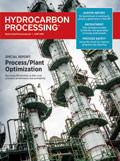
June 2015
Special Report: Process/Plant Optimization
The propylene in this stream from FCC and coking units can be combined with isobutane in an alkylation unit to yield a high-value gasoline blending component—alkylate.
It is important that efficient and reliable tools for acquiring emissions data are available. Environmental constraints not only can affect production, but failure to provide emissions values for extended periods may lead to an authority-imposed plant shutdown.
Based on the experience of execution, design, engineering and construction of an LNG complex in Asia, the author outlines key considerations that contribute to project success.
Prediction of mercaptan removal from natural gas streams with liquid solvents presents significant challenges. Using an extensive experimental data collection campaign and recently improved thermodynamic models, an innovative solution has overcome these challenges and developed a rate-based model to accurately predict mercaptan removal performance.
HPI Focus: Energy Efficiency
Better energy management can make the difference between profit and losses. The question facing owner-operators is: how to reduce energy costs while satisfying site energy needs?
Regional Report
The European hydrocarbon processing industry (HPI) is a complex set of refineries and petrochemical facilities distributed among several nations, all of which are critical to the international trading and economy of the EU.
Maintenance
Fouling in heat exchangers is common throughout the process manufacturing industries. Fouling presents a large opportunity for owner-operators to reduce operating expenses and maintenance costs.
Process Safety
Management of change (MOC) for process safety is well known, widely implemented and used by many employers, even when there is no regulatory requirement to do so, particularly in companies with complex and/or highly hazardous operations involving flammable, toxic chemicals and/or combustible dust.
Over the past 25 years, the process safety and functional safety disciplines have evolved from the implementation of safety legislation and the creation of governing authorities, to the development of best practices and the adoption of applicable standards.
Recruitment
The hydrocarbon processing industry (HPI) is facing a daunting challenge in the near future: In the next five to seven years, approximately 50% of the workforce will retire in what many are calling the ‘great crew change.’ The next generation of engineers, operators, technicians and skilled workers must step up to continue the pursuit of technological innovations and industry growth.
Columns
The downstream industry is halfway through 2015 and the second decade of the new millennium. Great changes have occurred over the past 12 months and five years. Change is not necessarily negative; in fact, it can be a welcome event.
An engineer working for a world-scale oil refinery in Asia-Pacific (AP) asked several questions on steam turbines: “I would like to know whether overspeed testing of steam turbines is recommended..
Population dynamics, including the impending retirement of the “baby-boomer” generation of workers and the associated need to quickly “onboard” the next generation of workers in the downstream industries are driving new demand for collaborative production systems/manufacturing execution systems solutions.
Although the 1975 ban on crude oil exports remains in place, US oil producers have found more opportunities in shipping condensate both domestically and internationally. This practice is possible due to condensate splitters, which provide a workaround solution by separating crude oil into lighter byproducts. Because these lightly refined byproducts can be exported, investment in new condensate splitter capacity has grown.
The recovery following the Great Recession has been long and hard for both the UK economy and its chemical industry. The chemical and pharmaceutical industry in the UK has not expanded on an annual ba..
The CEO of Mexico’s state-run Pemex sees Mexico’s downstream and midstream industries offering big opportunities for new and foreign investments on the heels of the country’s massive energy reform program.
Trends and Resources
UAE FCC catalyst manufacturing facility completes Phase 1W. R. Grace & Co. and JV partner Al Dahra Agriculture Co. marked the commissioning of a new catalyst logistics silo terminal (pictured) and the..
US refinery utilization rates have returned to summer operating levels. Crude oil pricing supports higher cracking margins for gasoline in US and European markets. Asian margins fell as increasing sup..
Air Liquide will build the world’s largest air separation unit (ASU) in Secunda, South Africa. An essential component of the 5,000-metric-ton-per-day ASU will be the AIRMAX compressor solution from MAN Diesel and Turbo, which will be the largest-dimension compressor constructed to date.
KBC Advanced Technologies Plc. has appointed Eric Dodd as CFO of the KBC Group. He will succeed interim CFO Andrew Hebb and serve as a member of KBC’s executive committee. Mr. Dodd will be appoin..
Video on long-life oxygen sensing innovation City Technology, a Honeywell company, has released a new video on how innovations and advanced technologies in long-life oxygen sensing are meeting key mar..
Aspen Technology’s aspenONE Engineering and aspenONE Manufacturing and Supply Chain Version 8.8 software was developed for firms in the oil, gas, chemicals, engineering and construction, and other process industries.

- INEOS receives €300-million grant to rejuvenate and decarbonize its Lavera plant 2/19
- AGC Vinythai commissions expanded chlor-alkali plant and e-BiTAC electrolyzers from thyssenkrupp nucera 2/19
- BASF launches AdBlue GE (green electricity) to decarbonize mobility value chain 2/19
- Carbon Neutral Fuels select Johnson Matthey, bp and Honeywell UOP technologies for UK SAF plant 2/19
- ExxonMobil starts operations on second carbon capture project in Louisiana (U.S.) 2/19
- Pall introduces two new technologies to reduce CAPEX and TCO in oil and gas processing 2/19




